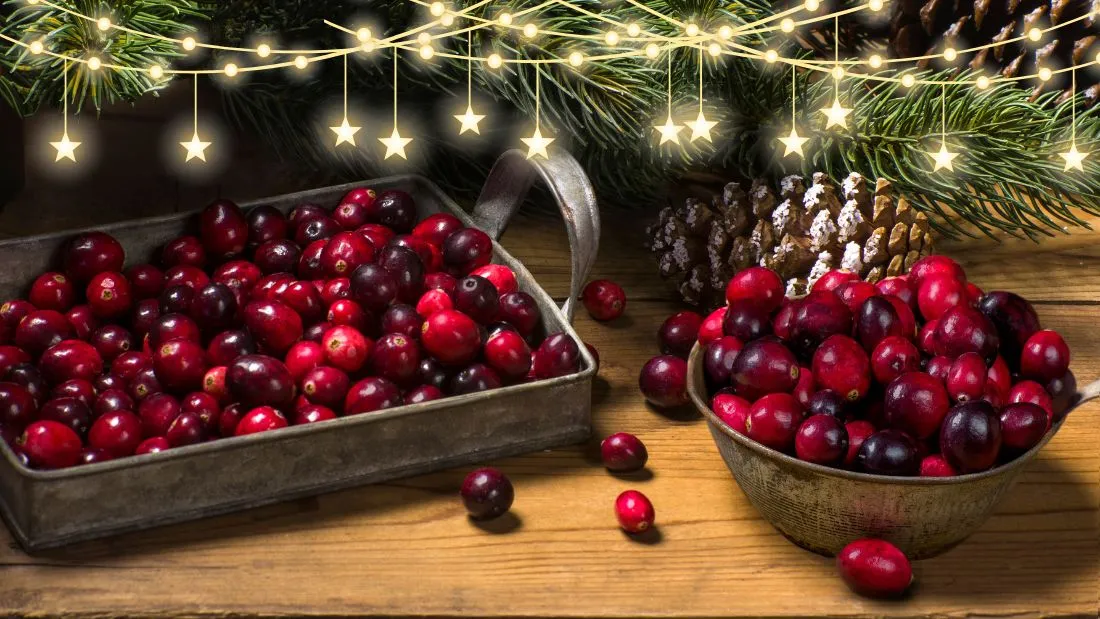Cranberries

Cranberries typically come from North America or eastern Europe, although they can be grown in the UK under the right conditions. They are usually harvested in the autumn and are available fresh in UK shops from October to December, in time for Thanksgiving and Christmas. They are known for their sharp tartness that gives way to a subtle sweetness and are most commonly enjoyed dried or juiced. But what health benefits do these little ruby-red beauties offer?
Cranberries boast several vitamins and minerals, including vitamins C, E and K and manganese and copper. They contain little protein or fat but provide a healthy dose of antioxidants.
Packed with antioxidants
Cranberries have a very high content of polyphenol compounds that act as antioxidants. They combat harmful compounds called free radicals, which can cause damage to your cells and increase the risk of chronic diseases such as heart disease and cancer. Cranberries contain a higher concentration of polyphenols than most commonly consumed fruit, most are found in the fruit’s skin where they contribute to the ruby-red colour.
Protect heart health
Studies suggest cranberries may help protect heart health by lowering LDL ‘bad’ cholesterol and increasing HDL ‘good’ cholesterol. Compounds in cranberries may also benefit your heart health by improving blood vessel flexibility, reducing blood pressure and improving circulation.
Anti-inflammatory properties
The antioxidants in cranberries can reduce inflammation, which may benefit people with conditions such as arthritis or diabetes. Scientists now believe that inflammation underlies most chronic diseases; heart disease, stroke, dementia and cancer all have been linked to chronic inflammation.
Supports immune function
Vitamin C and other bioactive compounds found in cranberries can help support your immune system – important during the winter months when cold and flu viruses are circulating.
Combats urinary tract infections (UTIs)
Cranberries contain natural compounds called proanthocyanidins (PACs) that can prevent bacteria from attaching to the lining of the bladder and urethra. If they can’t latch on, they can’t multiply and cause an infection. This may be helpful in the prevention of UTIs but most supplements and juices don’t contain enough to be effective. Also, many cranberry juices are very diluted with high levels of sweeteners so are unlikely to help.
A 2023 Cochrane review – the gold-standard in research – found that cranberry tablets and juice reduced the risk of UTIs, especially in women who suffer recurrent infections. Co-author of the review, Dr Elisabeth Hodson from the University of Sydney in Australia, said: “The general consensus is that cranberry is not effective in treating a UTI but is valuable in preventing it in certain groups of people”.
Dental health
The same mechanism is thought to be why cranberry juice may stop certain bacteria sticking to your teeth and so reduce the build-up of damaging dental plaque – the sticky substance containing acids and bacteria that causes tooth decay. However, the sugar that is usually added to cranberry juice, plus its natural acidity, can also contribute to dental decay. So don’t drink it too often!
Supplements
Supplements usually contain cranberry powder, which is made either from dried juice or the dried skins left over from the juicing process. Cranberry supplements made from juice are generally more effective than those made from skins, but it can be hard to tell which is which. Some manufacturers state the levels of PACs in their supplements and research suggests you need at least 36 milligrams a day to help prevent UTIs. The bottom line is that cranberries are not a cure for UTIs but might help prevent them if you take a high enough dose.
A word of warning
Cranberry juice contains high levels of oxalate, which can increase the risk of kidney stones. Therefore, those with a history of kidney stones should keep their cranberry consumption to a minimum.
How to eat cranberries
A 100-gram portion of raw cranberries contains around 14 milligrams of vitamin C, just over a third of your daily needs. If you dry or cook cranberries, some of the vitamin C will be lost. Dried cranberries retain all the same powerful vitamins and antioxidants as their raw version but tend to contain lots of added sugar. So, it’s a great idea to eat them raw, like raspberries or blueberries, add them to your porridge or cereal. If they are too sharp for you, blend them into a smoothie with other, sweeter fruit such as banana.




